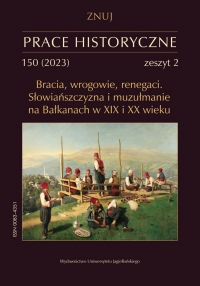„DOPÓKI NIE ODRZUCIMY WSZYSTKICH ŚLADÓW NIEWOLNICTWA”. REPETYCYJNOŚĆ POLITYKI PAŃSTWA BUŁGARSKIEGO WOBEC POMAKÓW
“UNTIL WE DISCARD ALL TRACES OF SLAVERY”: REPETITIVENESS OF THE BULGARIAN STATE’S POLICY TOWARDS POMAKS
Author(s): Petar DobrevSubject(s): Political history, Social history, 19th Century
Published by: Wydawnictwo Uniwersytetu Jagiellońskiego
Keywords: Muslim minority in Bulgaria; Pomaks; assimilation;
Summary/Abstract: The new Bulgarian state, which reappeared on the map of Europe in 1878, was inhabited by a multiethnic, multi-religious and multi-cultural population. The unification of the national structure was treated as an important task being faced by the authorities in Sofia. Part of this demographic mo- saic were Pomaks – Bulgarian-speaking Muslims whose number in the country increased after the Balkan War. Compared to the policies of other Balkan countries, Bulgaria had a relatively tolerant attitude towards Muslims, who were mostly Turks. The Pomaks were perceived by the state as Bulgarians who had cut themselves off from their ancestors. This attitude led to repeated waves of state repression throughout the 20th century, including the period of socialism. The article at- tempts to trace actions taken by the Bulgarian state to separate Pomaks from the Muslim tradition, which – although unsuccessful – left serious wounds in the historical memory of both Christians and Muslims.
Journal: Prace Historyczne
- Issue Year: 150/2023
- Issue No: 2
- Page Range: 337-353
- Page Count: 17
- Language: Polish

